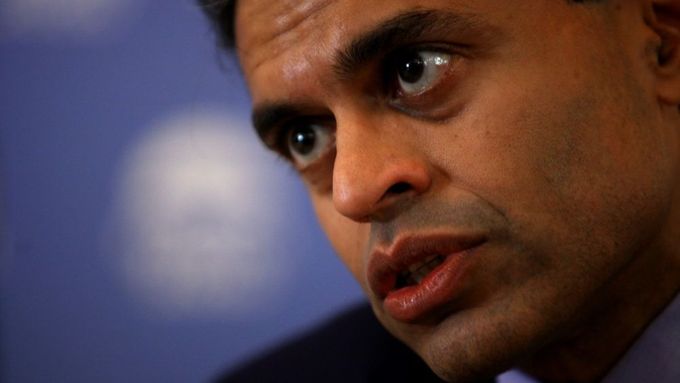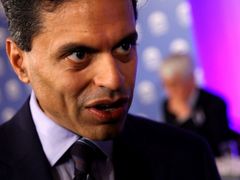Prague - Among the guests of the annual Forum 2000 conference on global issues, organized by former Czech President Václav Havel, was US political commentator Fareed Zakaria, well-known for his journalistic career, the "Global Public Square" weekly show on CNN, and also his books on contemporary politics. The latest contribution to his bibliography is The Post-American World published in 2008, in which he discusses the growing influence of regional powers such as India or China.
Fareed Zakaria agreed to the interview by Aktualne.cz. This is the first part of the interview, centered on US domestic issues such as Tea Party, economic problems and prospects of reform.
Here you can read the second part of the interview, focused on the US foreign policy.
Aktualne.cz: Recently, you warned against the growing gap in the US society between intellectual and business elite on the one side and average Americans on the other. This gap is now strongly visible in the upcoming mid-term elections. Do you think this is dangerous?
What we are seeing is a very dangerous decoupling in America. The top ten percent of America lives in a global world and does very well in that global world. It has access to capital, labor, markets, and it flourishes. It is the world of large multinational corporations, but also of most highly-educated Americans. Because all those people are surfing the globalized world. They are consuming a certain kind of information, they are doing highly value-added, high-skilled jobs, they are manipulating symbols, words, images, technical information, and that symbolic manipulating is a highly-priced global knowledge industry.
The rest of America is not in that world. And it is becoming clearer and clearer for average Americans that they are up against a monumental new challenge of global competition with one billion people around the world. If they are making anything with their hands, there is somebody making it in China for one tenth. But the top tier of America actually benefits from this because there is more growth in the world, there is cheaper capital, so they can buy bigger houses, there is all kinds of benefits. It is the central divide in America.
A.cz: Can this divide be bridged, be it by Barrack Obama or by some Republican politician?
Honestly, I don't know how this can be bridged. I think that it's easy to theoretically come up with an answer, whether a new politician or Obama. But it's much easier to imagine a politician who will become a demagogue. Think of the numbers: it's nine to ten, or 85 to 15, but not much more than that. And this rising inequality is a natural consequence of trade, technology and globalization. This is not a secret plot of multinationals, it is simply the reality. What I worry about most is what happens to the politics of the country, with the collapsing middle class.
A.cz: Do you think there is a real danger of some demagogue appearing on the political scene?
Absolutely. Politics is a little bit like market. If there is a demand for a product, there would be a supply. In some way, the Tea Party can be a small version of this. I don't want to exaggerate or be overly critical, because we don't know enough about this, it's a big movement, it combines many different things from libertarianism to populism. But, there is no question, it's angry. It is very fearful and closed on issues such as Mexican or Muslim immigration. If the economy remains very slow and stagnant for several years, we could very easily imagine some politician offering an easy, populist solution.
A.cz: Is this danger limited only to the political right?
No, the populism can come from the left as well, with a left-wing populist saying: "Bankers and big corporations are privileged, we have to return the power to the people." There is a whole history of American populism on the left. I am very worried about American politics, more worried than I have ever been in the 25 years I have been living there.
A.cz: America is facing a wide array of problems, but the political system is unable to create consensus and put through solutions to them. Do you see any chance of any reform to make the system more effective?
Right now I see no signs of significant reform. And I argue that with four or five significant reforms, not actually that painful, the US would be in a completely different position. If you would simply raise the retirement age by two or three years, put some cost controls in the medicare system, introduce a five to seven percent value-added tax, and cut some of the defense spending, the US would have a stable budget for the next 20, 30 years. America is still a very dynamic economy, and yet it seems that those moderate, modest reforms are simply impossible.
A.cz: Will the US simply accept the fact that it is heading towards decline?
Americans have some virtues, but some flaws. And one of their flows is reacting better to a heart attack than to a cancer. Pearl Harbor was a heart attack. Cancer is a slow process. The US faces a cancer, but we are not really confronting it.


